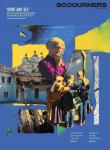IN HER BOOK The Great Emergence, the late Phyllis Tickle pointed out that the church undergoes a “rummage sale” about every 500 years in which dominant forms of its spirituality are displaced from prominence by newer forms of spirituality. It’s much like a purge one would have when decluttering a home or preparing for a move. Older forms of spirituality aren’t done away with; they simply are no longer dominant. New things come to the forefront.
By the fourth century, the locus of Christianity had shifted from ancient Israel and Syria to a Christendom based in European and Western civilization (though a thriving Eastern church remained and does so today). About 40 years ago, another shift occurred. Now there are more Christians in the Global South than in Europe and North America. And Christianity continues to wane in the West. To the extent Christianity has accompanied colonial expansion, I believe this too is a kind of purging. Many of us wrestle with church doctrines and practices that have been in service to domination power for a long time but are untenable in a just world. Who God needs us to be today is markedly different from whom we’ve been in the past.
This month’s texts call to mind the words of the liberation song: “They say that freedom is a constant struggle. Oh Lord, we’ve struggled so long, we must be free, we must be free.” Freedom is not a static destination. Freedom must be maintained, much like the state of a house. Whatever God is calling us toward today, it won’t be necessarily familiar or even pleasant, but it will make us free.
September 4
Any Room for Hate?
Jeremiah 18:1-11; Psalm 139:1-6, 13-18; Philemon 1:1-1:21; Luke 14:25-33
THIS WEEK'S TEXT from Luke is one of those I’ve struggled with for years. Jesus—the one we associate with love—is telling the crowd they must hate people. And not just anyone, but their family members! After studying Greek in seminary, I was sure there was more to the story. Translations from ancient languages often miss something because words have different connotations in their original context. Surely, if the Prince of Peace and the embodiment of love is telling someone to hate someone else, then we’ve lost something in translation. But, to be honest, the word is right there in the Greek text: miseō (14:26). Hate! The prefix for misogyny or misandry. There’s very little other connotation for this word.
Family obligations were serious matters in Jesus’ context. One had a moral and religious duty to care for family. You risked death for disobeying your father. You were obligated to take into your home your widowed mother in need. But Luke 14 is one of many texts in which Jesus ostensibly undermines those family structures. Jesus adds that we are to hate “even life itself” (verse 26), meaning any commitment to follow him must encompass all and be placed above all other allegiances. If our families are already full, then there’s no room for us to extend ourselves to those without the protection of family. On a larger scale, if the entire world is to be our family, then what place does nationalism have in the heart of a follower of Jesus?
Western Christianity regularly seems to leave out God’s propensity to judge nations, not only individuals. Jeremiah’s vision of how God can reshape whole peoples as easily as the potter reshapes wayward clay is one of many judgments on nations. While God forms our inward parts, God does not stop at individual formation. God also works hard at forming us collectively because who we are together matters to God.
September 11
God Still Searches
Exodus 32:7-14; Psalm 51:1-10; 1 Timothy 1:12-17; Luke 15:1-10
TODAY MARKS THE 21st anniversary of the Sept. 11 attacks on the United States. I remember vividly the panic of that day and my own relief when I finally located my mother, who’d briefly been unaccounted for amid the chaos. Some families still have not received the remains of loved ones lost that day. Jesus’ parables of the lost sheep and lost coin ring loud in this context. Jack Bartlett Rogers, moderator of the Presbyterian Church (U.S.A.) at the time, reminded the church, “This is the way it is every day in Jerusalem and Ramallah and many other places in the world.” Indeed, this is the way it is in Haiti and Ukraine and in the U.S. cities of Uvalde and Buffalo today. We are still lost!
The Greek word metanoia, often translated as “repent,” is made up of two Greek words meaning “after thought” or “think again.” It means to change one’s mind, to stop a course of action and turn around. In Exodus 32, God apparently changed God’s mind: “And the Lord repented of the evil which he thought to do to his people” (verse 14). God had a second thought. While we think of God often as steady and unchanging, here God models what it looks like to change one’s mind for the purpose of restoring relationships. Moses appealed to God’s inclination toward relationship.
Metanoia means to reorient oneself when it becomes clear one has fallen out of right relationship with another. The number of people who died in the U.S. by gun violence in 2020 was 15 times that of those who died on 9/11. We are not in right relationship with each other. Yes, we are still lost. But God still searches for us. It does not matter how or why we got lost; all God cares is that we think again of God and that we are found.
September 18
Trickster Justice
Amos 8:4-7; Psalm 113; 1 Timothy 2:1-7; Luke 16:1-13
“ANTI-CAPITALIST CAPITALISTS” are wealthy people approaching their wealth in nontraditional ways. Instead of working to multiply wealth for their family’s benefit, they are generating money to give it away. Members in this movement take great care to invest in poverty alleviation, promote racial justice, and support development of renewable energy. Wealth is a way for them to improve the quality of life for all, not just themselves.
In the U.S., we aren’t used to seeing this approach to wealth. We are more accustomed to how systems of wealth adversely impact those already struggling. In an unjust economy, one might argue that all money is “dirty” money and question whether any good can come of pursuing it. The text in Luke 16 suggests that Jesus didn’t think too highly of the economic systems of his time, either. But this parable apparently praises the “dishonest” manager, whose last act as manager is one of liberation for his employer’s debtors, for his shrewdness. Even his boss applauds the manager for that kind of cunning!
The prophet Amos pronounces judgment on those who “buy the poor for silver” (8:6). The psalmist praises the God who lifts up the poor (113:7). Jesus’ parable reminds us that justice for the poor is not only God’s responsibility, but ours as well. In nearly all folklore, there are tricksters who use the system to undermine the system. Br’er Rabbit, a trickster character in African-descendent folklore, is one example. Tricksters teach us the value of ingenuity when justice is in short supply. In Luke’s gospel, the manager is something of a trickster whose actions could be viewed as civil disobedience. Perhaps we are invited to find surprisingly creative ways of doing justice in unjust times.
September 25
Homecoming Season
Jeremiah 32:1-3, 6-15; Psalm 91:1-6, 14-16; 1 Timothy 6:6-19; Luke 16:19-31
MANY CHURCHES AND academic settings celebrate “homecoming season” this weekend. People who engaged with an institution at various times in its history venture “home” to rekindle relationships and visit places that once nurtured them and helped them grow. They’ll see the old people and haunts who, for better or worse, contributed to their development. They’ll take in what’s new and unfamiliar. Invariably, particularly in church spaces, there is a lament that things “aren’t the way they used to be.” The church has a lot of practice in longing for the good old days.
The prophet Jeremiah is instructed in today’s text to buy a piece of land from his cousin as an assurance of Judah’s return from exile. It’s an act of faith on his part, though the return they were waiting for wouldn’t happen for 70 years—and still it wouldn’t be like “the good old days.” Jesus’ story of Lazarus and the rich man in Luke 16 shows both the danger and futility of longing for past paradigms while squandering present opportunities. We should, as the first letter to Timothy instructs, “pursue righteousness, godliness, faith, love, endurance, gentleness” (6:11) while we still can.
Our present world needs a church engaged in present realities. A church that has enjoyed the esteem of the state in the past must now be willing to be on its bad side and speak truth to power. Our past is there to remind us that God has always been with us, but that is not where our future lies. Jesus has gone ahead of us. The past was never our home.

Got something to say about what you're reading? We value your feedback!







